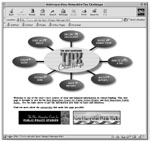Spring 1999
N.H. Residents Compute Tax Plans
By Walter C. Dean
Pew Center
 More than a year ago, the New Hampshire Supreme Court threw out the state’s method of using local property taxes to pay for public education.
More than a year ago, the New Hampshire Supreme Court threw out the state’s method of using local property taxes to pay for public education.
Now, the inevitable is beginning to sink in: Residents of the “Live Free or Die” state are going to have to pay a statewide property tax, an income tax, or a combination of both, for the first time in New Hampshire’s 224-year history.
The legislature was considering several tax proposals. With the help of Internet technology funded in part by the Pew Center, New Hampshire citizens can participate in the debate knowing precisely what each plan will cost them.
All they need to do is call up the New Hampshire “Tax Challenge” web page (www.unh.edu/ipssr/nhcpps/nhprcpps.html), a creation of New Hampshire Public Radio and the state’s Center for Public Policy Studies.
The “Tax Challenge” web page has attracted more than 9,000 visits since it went on line in October. Besides background information on the court rulings and proposed legislation, the site allows visitors to use an on-line calculator to figure out what the various proposals will do to their taxes.
While the concept of using a calculator is fairly straight forward, the data on which the numbers are based are highly complex. Douglas Hall, executive director of the Center for Public Policy Studies, has collected tax data since his days as a state legislator. He has compiled a computerized spreadsheet containing information on 234 communities. Within each are 40 files, comprising such things as property values, assessments, school populations, the number of houses and businesses and the municipal, county and state tax levies.
Without that raw data, containing more than 9,000 entry points, the calculator never would have worked, says Senior Editor Jon Greenberg, who has been spearheading the “Tax Challenge” for New Hampshire Public Radio.
As important, says Greenberg, was Hall’s expertise in determining the weight given to assumptions about spending under a new plan. “You cannot go into this thinking one formula will automatically work,” he says. “It’s a matter of news judgment in putting together the calculator.”
When the calculator was first introduced, Greenberg and Hall programmed it with “generic, broad-based” plans. As the legislature narrowed the alternatives, the calculator was reprogrammed and now contains the three most likely tax scenarios.
To use it, visitors simply click the web site’s “Tax Calculator” icon, then enter their county, their property’s assessed value, the number of people living there, their income and the amount of state taxes they’ve paid. They can then calculate their projected tax under each of the three plans. About half those who have visited the site have done so.
Greenberg believes at least some may be unable to use the calculator because they don’t have an updated browser even though one is easily available, free, from many Internet sites.
Interest in the calculator is increasing as the legislature moves closer to a decision. About 800 people visited the site the first two months it was on line. As of March 15, the number increased to 9,147.
Greenberg says the calculator has not only empowered New Hampshire citizens, but provided his newsroom with valuable reporting tools as well. The database has allowed reporters to profile how representative households (example: a married couple making $45,000 annually with two children) would fare in various communities under each of the plans.
“I have at my fingertips a way to analyze different proposals in a very concrete way,” Greenberg says. “It is enormously valuable.”
As important, he says, are the comments in the site’s Feedback Zone. About 175 people have weighed in and reporters have pursued several individual stories. “We’ve actually been able to have one-on-one encounters with people where we’ve seen them changing their opinions over time,” Greenberg says. “It’s incredible.”
As part of the “Tax Challenge”, about 15 media partners have helped set up a series of forums across the state. Greenberg provides organizers with a list of logistical suggestions and background materials. Local civic organizations do the rest, often working with a newspaper, radio or television station. Ten forums have been held so far, some drawing more than a hundred participants; more are planned.
